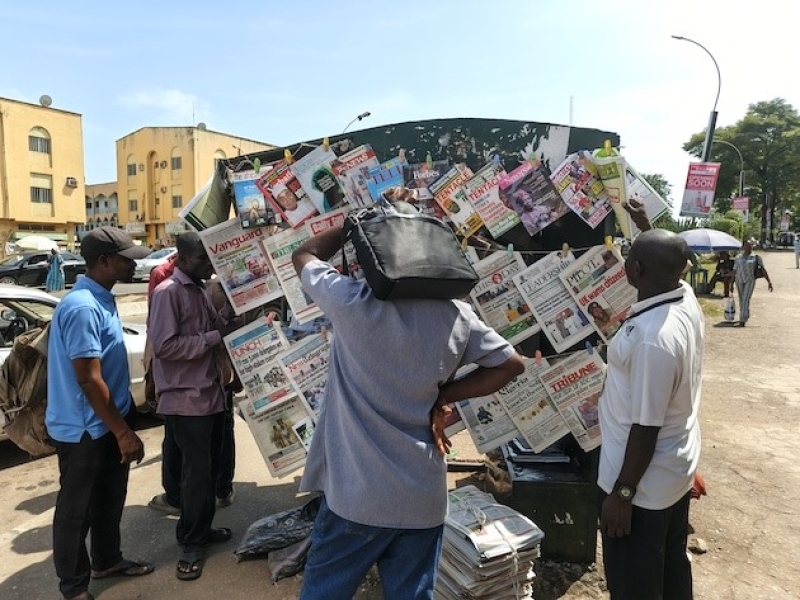- Dhaka breaths ‘very unhealthy’ air Wednesday morning |
- Referendum Ordinance, 2025 issued |
- Chemical fertilizer overuse threatens soil health in northern BD |
- C.A. Yunus expresses concern, sympathy over Korail slum fire |
- UNAIDS Warns of Deepest HIV Response Setback in Decades |
Trump Threatens Military Action in Nigeria, Sparks Tensions

Nigerians at a newspaper stand with headlines reflecting the Trump versus Nigeria saga.
Diplomatic relations between Nigeria and the US have continued to sour after US President Donald Trump threatened military intervention over what some American lawmakers have called “Christian genocide” in Africa’s most populous country.
In a series of posts on his social media platform on 31 October, Trump accused the Nigerian government of ignoring the killing of Christians by “radical Islamists.” He warned that Washington would suspend all aid to Nigeria and would enter the country “guns-a-blazing” if Abuja failed to respond.
“Christianity is facing an existential threat in Nigeria. Thousands of Christians are being killed. Radical Islamists are responsible for this mass slaughter,” Trump wrote.
He went on to declare Nigeria a “country of particular concern” for alleged violations of religious freedom, instructing the US Department of War to prepare for “possible action” and warning that any strike would be “fast, vicious, and sweet.”
Trump’s remarks follow years of lobbying by American evangelical groups and conservative lawmakers, who accuse the Nigerian government of complicity in attacks on Christians. Earlier this year, Trump also claimed South Africa was committing genocide against white farmers. The US recently stayed away from the G20 summit in South Africa, apparently over these widely disputed claims.
Disputed Narratives
According to Open Doors International, an organization tracking persecuted Christians, Nigeria remains one of the world’s most dangerous places to be a Christian, ranking seventh on its 2025 World Watch List.
A report by the International Society for Civil Liberties and Rule of Law estimated that jihadist groups killed more than 7,000 Christians and abducted 7,800 others in 2025 alone. Since 2009, they claim over 125,000 Christians have been killed, 19,000 churches destroyed, and more than 1,100 communities displaced.
Open Doors’ data suggests that Christians in northern Nigeria are 6.5 times more likely to be killed and five times more likely to be abducted than Muslims. However, Nigerian authorities have rejected claims of a state-sponsored Christian genocide, insisting that both Christians and Muslims suffer from extremist violence.
Analysts caution that portraying Nigeria’s insecurity as purely religious oversimplifies a crisis rooted in political and economic failures. With 230 million citizens divided almost evenly between Christians and Muslims, the country faces multiple overlapping threats, including Boko Haram’s Islamist insurgency, farmer-herder conflicts, ethnic rivalries, and separatist agitations in the southeast.
While Christians are among those targeted, many victims of armed groups are Muslims in northern Nigeria, where most attacks are not driven solely by religion. Data from the US-based Armed Conflict Location and Event Data Project (ACLED) shows that between January 2020 and September 2025, 20,409 civilians were killed in 11,862 attacks across Nigeria. Of these, only 385 incidents were explicitly linked to victims’ Christian identity, resulting in 317 deaths, while 196 attacks targeted Muslims, leaving 417 dead.
“Trump’s comment has certainly drawn global attention to the problem of insecurity in Nigeria, but it also raises questions about foreign influence and national sovereignty,” said Oludare Ogunlana, Professor of National Security at Collin College in Texas. “Many who present themselves as experts on African or global security often lack a nuanced understanding of Nigeria’s realities.”
He described Trump’s claims as misguided, stressing that Nigeria’s insecurity is multifaceted and should not be given a purely religious framing. “It reflects systemic governance failures, economic inequality, and weak law enforcement. Citizens of all faiths—Christians, Muslims, atheists, and traditional believers—have suffered from kidnapping, organized crime, and other forms of violence.”
Religious Tensions
Trump’s remarks have inflamed tensions, with analysts cautioning that framing Nigeria’s insecurity as a religious conflict risks deepening divisions. Several Muslim groups condemned Trump’s comments as an attack on Islam and an attempt to demonize Nigeria’s Muslim population.
Days after Trump’s comments, members of the Islamic Movement in Nigeria marched through Kano to protest the threat of US military action. Chanting “Death to America” and burning the US flag, demonstrators carried placards reading “There is no Christian genocide in Nigeria” and “America wants to control our resources.”
Northern states like Kano have a long history of religious riots, and observers warn that renewed rhetoric could deepen sectarian divides in a region where relations between faiths remain fragile.
Christian and non-Muslim groups, on the other hand, maintain that persecution is real. They cite reports noting that more than 300 Nigerians have been killed over alleged blasphemy since 1999, with few perpetrators prosecuted.
Deborah Eli Yusuf, a peace advocate with Jugaad Foundation for Peace and Nation Building, stressed the government should collaborate with stakeholders to maintain peace. “This is an opportunity for the government to lead honest interfaith conversations and dialogues that can lead to mutually agreeable resolutions,” she said.
Abba Yakubu Yusuf, Coordinator of the Reves Africa Foundation, emphasized that while Nigeria faces multiple forms of violent conflict, acknowledging that Christians are being specifically targeted is the first step toward solutions. “Since 2009, killings in southern Kaduna, Plateau, Benue, and parts of Kano have largely been religiously motivated,” he said. “Without addressing this, continued denial could harm the country’s economy and deter investors, creating a climate of fear.”

